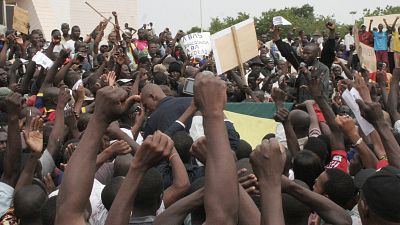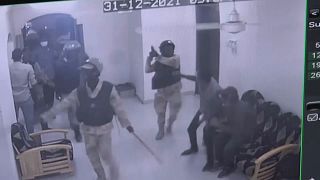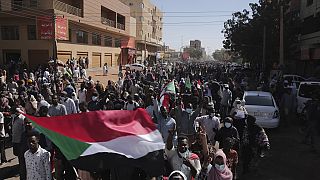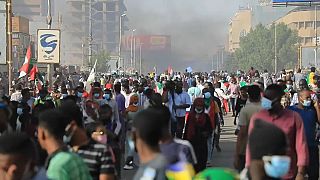Mali
Protests have proven a viable tool for showing socio-political or economic resistance and people across Africa employed it multiple times this year. Whereas some protested against their governments, for others it was to demand government attention to act in a certain way.
As is usually the case, some of the protests led to clashes with security agencies whereas others passed off smoothly. Africanews’ review of the 2021 news year, looks back at some of the major protests that rocked the continent.
In northern Africa, the protest movement that toppled Abdul Aziz Bouteflika in 2019 continued its mass action, this time against the Abdelmajid Tebboune government that took over from Bouteflika.
A series of mass protests, nationwide rallies and peaceful demonstrations were held to demand real democratic reforms and a dismantling of the deep state that was birthed by the Bouteflika years.
Over in Tunisia, protests started earlier in the year with respect to handling of COVID-19, corruption and general economic crisis etc. The height of the protest was when President Kais Saeid dismissed the National Assembly and assumed its powers forcing mass protests to protest what was tagged a power grab.
**West Africa protests - Mali, Burkina Faso, Senegal, Ghana **
In Mali, protesters demanded that the government should defy European Union and France and enter security agreements with Russia in the fight against terrorists. The protests took place in May while in October, anti-France protests were held especially in Bamako.
In November, Burkinabes took to the streets to demand government action in the wake of deadly attacks by terrorists in the country. This came at a time the president had taken the Defense portfolio and subsequently, the then-PM Joseph Dabire resigned late this year.
In March 2021, Senegal was engulfed in mass protests that centered around the arrest of a rising young politician Ousmanou Sonko, a lawmaker and former Presidential aspirant.
He was charged with rape but most of his followers insisted that it was a case of political witch hunt and a ply to silence potential challengers to President Macky Sall, the protests led to deaths and destruction of public and private property in parts of the country.
In the case of Ghana, multiple protests were held in the country largely with full support and cooperation of the Police despite these protests being against government and its policies.
The #FixTheCountry protests evolved from an online agitation till it hit the streets of Accra and another regional capital. A protest against a new tax proposal, the Electronic transactions levy (E-levy) that a group wanted scrapped. Law students held protests as did toll booth workers and a teachers’ group.
Central African protests - Cameroon, Chad and the Democratic Republic of Congo
In Chad, it was anti-government protests after son of Idris Deby was appointed President and leader of transition after his father’s death. Pro-government protests were also held at a point.
In the DRC, it was students who took their protests to the National Assembly, demanding that government negotiates with striking teachers to return to the classrooms.
Cameroon’s Anglophone crisis rolled on unabated but it was in Bamenda that people flooded the streets to protest the death of a young girl who had been shot mistakenly by government forces.
**East Africa protests - Sudan and Ethiopia **
The Sudanese protests were a carryover from the movement that led to the overthrow of Omar alBashir in 2020.
Protesters were back on the streets demanding justice for people who died during the revolution. But the military coup that removed civilian PM Abdalla Hamdock and ripped the civilian-military transition of 2020 triggered new protests against the military rulers. The protests in Ethiopia were largely concentrated in the capital Addis Ababa and were against a rampaging rebel advance.
The Tigrayan rebels had spread their fight with the federal government and were bent on reaching Addis Ababa to remove Abiy’s government. The protests were in support of the government and also to denounce imperialism after people alleged that the EU and US were supporting the rebel advance. Some protests also lauded Russia and China and worthy allied while slamming the US and EU.
Southern Africa protests - Eswatini, South Africa and Malawi
In tiny Eswatini, pro-democracy activists gave the Mswati government a hard time in a protest that got support from a wide range of people including students and nurses. South Africa’s protest was a mix of politics, security and ended with economic consequences.
Former President Jacob Zuma was jailed for contempt of court (the politics), his base got riled up and went on rampage in economic hubs, burning and looting from major shopping centers (the economic). Eventually the government pointed to security implications whiles counting the huge economic losses that resulted in the protests. It took a joint deployment of police and the military to quell the crisis.
In early November 2021, the government of Malawi was hit by protests in the main commercial capital of Blantyre. Police eventually fired tear gas canisters to disperse the protesters.














01:49
Sudanese refugees in Chad face deepening humanitarian crisis
Go to video
Senegal’s finest sheep vie for bloodline prestige at pageant
01:06
China, Senegal pledge stronger strategic partnership during Beijing talks
00:48
Death toll in Kenyan anti-government protests rises to 16, says rights group
00:58
Ghana's parliament approves $2.8 billion debt restructuring deal
01:02
Heavy police presence in Nairobi ahead of anniversary protests